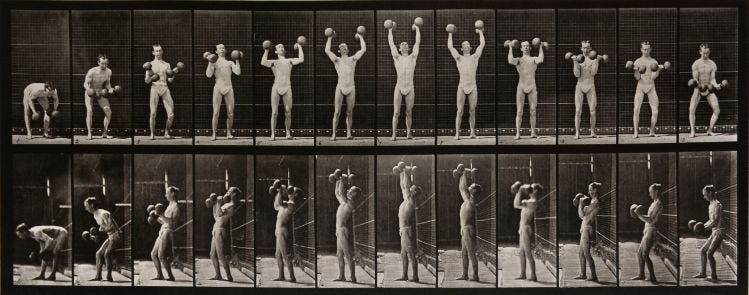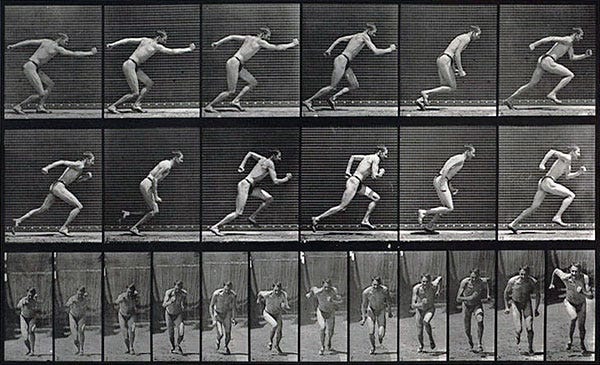So You Want to "Fix" Your Posture?
Trying to fix your posture is like trying to win at musical statues forever.
So you want to fix your posture? Well, you have already made your first mistake!
Posture cannot be fixed. Your posture - whether good or bad - is not a fixed position. Posture is made of movements.
Your posture is the end result of a series of movements you are doing with different parts of your body. These are habitual and mostly subconscious.
You "decided" how to coordinate these movements when you were a child, and now years later you sit and stand in the same general way. Your once living movements have been frozen into a "posture" that now happens by itself.
But no matter how rigid you become, you never stop moving. You have never stopped moving, since you were a cheeky little sperm swimming around looking for a hot egg. Which was inside mother who has also always been moving. And outside of mother, father was definitely moving - after making his move - and I don't need to describe the definite movements that were required to propel the sperm towards the egg in the first place.
Then out you fell, crying, crawling, standing, walking...always moving, never stopping even in deep sleep, and finally here you are trying to figure out how to "fix" your posture and wondering why you can't seem to find the correct position. To put this feeling into words: "oh I just want to set and forget my posture and get on with my life."
This static way of thinking, of conceiving the world around us, is an example of how we are bewitched by language. All day long your entire anatomical structure is continually making little readjustments to keep you standing or sitting or walking. We can only fix ourselves verbally, not in reality.
The problem here, then, is not physical, it is mental.
The words we use can have a misconception embedded within them, a view of the world that is false-to-facts, and from this error follows all sorts of seemingly "physical" problems. And from this it follows that you look for physical solutions.
For example, if you assume posture is a fixed position then you will look for solutions to fix you into what you think is the correct position: so you try wearing a shoulder brace or different shoes or buy a special chair. Or you look for tricks to keep you in the best position for sitting, standing, walking or sleeping.
You have been told to "stand up straight with your shoulders back" so you go to the gym and do exercises like facepulls to make your shoulders stay back, to FIX them in position. And when they go back to where they were before? Do some more, harder, heavier, and fix them into place properly this time!
You are sitting in your chair, you have some aches and pains, you keep fidgeting trying to find a new position, trying to fix your posture. You browse the internet for instructions and images of the correct fixed position and then you try to imitate that position. You think the problem is that you just don't remember to have good posture, that you forget and lose the correct, fixed position.
But if you have ever played "musical statues" then you know that you can never really be perfectly still. That is the whole point of the game, to catch you out when you eventually and inevitably are seen to move. But this concept of fixed, to fix, although experientially we know is untrue and impossible, it is still lurking in the background when we think of our posture as an adult.
Trying to "fix" your posture is like trying to win at musical statues forever.
Don't worry, one day rigor mortis will set in: "you're a long time fixed". Bad posture is a bit like early onset rigor mortis. So for now, we should focus on living and moving, and changing our way of thinking - which is simply movement on another level.
Let us look at this little word fix, which originally referred to the fixed stars in the sky - seen to be "unchangeable in position," as opposed to the other stars and planets which are seen to move - but which we now know are not fixed at all - they are dancing around the galaxy, moving around just like everything else.
“To fix is to make fast, or permanent; to set immoveably, &c.: hence, to fix a watch, is to stop it, or prevent it from 'going;' which, it must be admitted, is a very unsatisfactory mode of repairing that article."
Like a watch you have many moving parts. Unlike a watch you can't be repaired and brought back to correct working order, because you were never "correct" in the first place. You just didn't finish learning how to keep moving in more and more efficient, dextrous and intelligent ways.
The machine metaphor is useful in some places to a point, but if you unconsciously apply it to your life and posture then this mental (mis)conception will generate physical problems - if not now, then later in life.
So the first thing I do with my pupils is to change your conception of what it means to improve your posture. We are not looking for a correct position you can "set and forget." I am here to help you learn how to move more intelligently. Not how to "fix" your posture, but how to direct the many movements that create your posture.
If you want to try a 1-to-1 lesson here’s the link.




